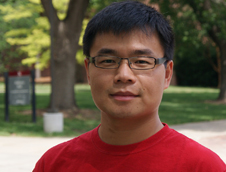
UNL Earth and Atmospheric Sciences graduate student Xiaoguang "Richard" Xu has been awarded a NASA Earth and Space Science Fellowship, which gives him $90,000 to support his research over the next three years.
Xu, who is pursuing his doctorate, hopes to use his research to improve the estimating of atmospheric dust sources based on remote sensing observations from the NASA satellite.
“Due to its global coverage, satellite remote sensing is the best way to tell where the dust plumes are and as well as their size,” he said. “Based on those observations, we can trace back the dust sources using inverse modeling technique and improve their representations in the atmospheric models and further advance our understanding of their impacts on the Earth’s climate, air quality and human life.”
Most often, we think atmospheric dust particles come from natural sources, like the desert, said Jun Wang, Xu’s adviser and an assistant professor of Earth and atmospheric sciences. But with the change of climate and the rapid urbanization across the globe, human activity is emerging as another source. Without any boundaries in the atmosphere, the dust particles can be transported long distances, affecting the air quality and climate globally.
“Dust is a wild card in the prediction of climate change, because its composition, size and shape vary highly with space and time,” Wang said. “The limited ground-based observation network over the land is far insufficient to describe where and how dust particles are distributed in the atmosphere. NASA’s satellite data can repeatedly monitor and track the dust plumes several times a day and it is global.”
Airborne dust particles can cool the planet by reflecting solar radiation back to space and warm the atmosphere by absorbing infrared radiation. Xu’s work, with the use of satellite observation, represents an important step to better project the climate at both global and regional scales, Wang said.
Originally from the Henan Province of China, Xu has studied at UNL since 2008. He said he was drawn to UNL because of Wang’s research expertise in the area of satellite remote sensing.
Xu holds a bachelor’s degree in atmospheric sciences and a master’s degree in metrology, both from Lanzhou University.
The highly competitive NASA Earth and Space Science Fellowships are available in earth science, heliophysics, planetary science and astrophysics. Xu is one of 54 recipients in Earth science research selected from 287 applicants.
The purpose of the fellowship is to ensure continued training of a highly qualified workforce in disciplines required to achieve NASA’s scientific goals.
- Jean Ortiz Jones, University Communications